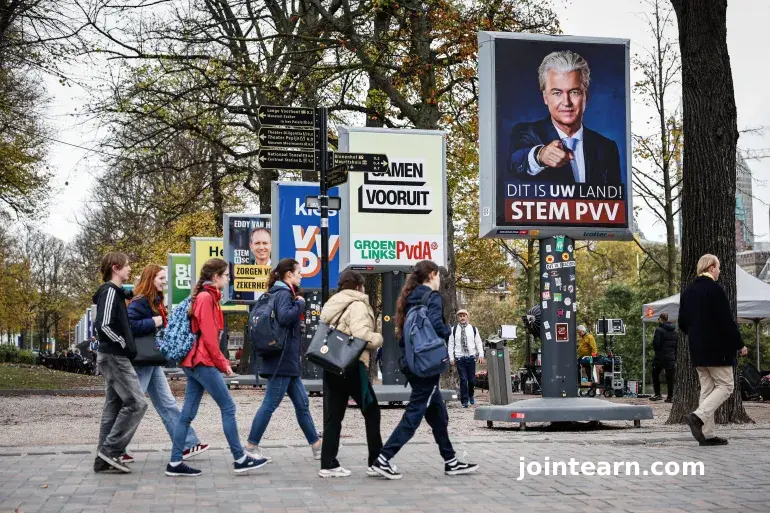
Exit polls from the Dutch general election suggest the centre-left D66 party, led by Rob Jetten, is set to emerge as the largest party in the Netherlands’ next parliament, narrowly edging out Geert Wilders’s far-right Freedom Party (PVV).
The result, if confirmed, would be a major blow to Wilders, who had been widely expected to secure first place in Wednesday’s high-stakes vote that centered on immigration, housing, and the future of the European Union’s fifth-largest economy.
D66 Projected to Lead, Far-Right Freedom Party Trails Close Behind
According to exit poll data, D66 is projected to win 27 seats in the 150-seat Dutch parliament, while Wilders’s Freedom Party is estimated to secure 25 seats. The centre-right VVD—the party of former Prime Minister Mark Rutte—is projected at 23 seats, and the Green-Labour alliance, led by former EU Commissioner Frans Timmermans, is expected to win around 20 seats.
However, with a margin of error of up to three seats, the race remains too close to call until all votes are counted. The final results will determine which parties can form a coalition, as no single party in the Netherlands ever wins an outright majority under the proportional representation system.
Jetten: “Dutch Voters Have Rejected Far-Right Politics”
Celebrating the early results, D66 leader Rob Jetten said the vote marks a turning point for Dutch politics.
“The people of the Netherlands have sent a clear message — it’s time to move forward with cooperation, stability, and unity,” he told supporters in The Hague. Jetten vowed to seek alliances with other mainstream parties to form a “stable, responsible coalition,” adding that the result signals a farewell to “the politics of fear and division.”
Meanwhile, Geert Wilders refused to concede defeat, insisting that his Party for Freedom had achieved its second-best result in history. “We’re still in the race. The final count could still put us ahead,” he said, maintaining that Dutch voters remain “fed up with mass immigration and cultural change.”
Immigration and Housing Dominate the Campaign
The 2025 Dutch election was dominated by heated debates over immigration, housing shortages, and rising healthcare costs. Wilders—often dubbed the “Dutch Trump”—ran a populist campaign promising strict immigration limits and withdrawal from certain EU policies.
However, concerns over the far-right’s rise prompted a late surge in support for moderate and progressive parties. Half the electorate remained undecided until election day, contributing to high suspense as polls closed at 9pm (20:00 GMT).
Reporting from Amsterdam, Al Jazeera’s Hashem Ahelbarra noted, “The race is so tight that it’s impossible to determine the final outcome yet. The suspense here is immense.”
Coalition Talks Ahead: Who Will Form the Next Dutch Government?
Under the Netherlands’ proportional representation system, no single party can reach the 76-seat majority needed to govern alone. Coalition negotiations could therefore take weeks—or even months—to finalize.
With mainstream parties again ruling out any partnership with Wilders due to his anti-Islam rhetoric and anti-immigration stance, attention turns to Jetten’s D66 and other centrist forces such as VVD and the Greens-Labour alliance.
Analysts predict that the leader of the second-largest party could ultimately become prime minister if D66 is unable to secure a workable coalition majority.
Far-Right Setback Reflects Europe’s Shifting Political Winds
Wilders’s defeat—if confirmed—would mark a rare setback for Europe’s surging far-right movement, which has gained ground in France, Germany, and Italy. His PVV triggered this snap election by pulling out of a fragile coalition government earlier this year amid disputes over immigration quotas.
In a pre-election interview, Wilders said voters were “fed up with mass immigration and cultural change,” declaring that “the future of our nation is at stake.” But despite his fiery rhetoric, exit polls suggest that many Dutch voters opted for more pragmatic leadership focused on tackling economic and social challenges.
Key Issues: Housing Crisis, Healthcare Costs, and Youth Disillusionment
The Netherlands faces a severe housing shortage, particularly affecting young people and low-income families in cities like Amsterdam, Rotterdam, and The Hague. Rising healthcare costs and proposed cuts to basic health coverage were also top concerns among voters.
“Housing and healthcare are critical issues,” said Anabelle Van der Bergh, a voter in Utrecht. “People want stability and practical solutions, not endless political drama.”
The Dutch Electoral Commission registered 27 political parties and 1,166 candidates in this election, producing one of the largest ballots in Europe.
Outlook: A Divided but Democratic Netherlands
As the Netherlands awaits official results, political observers predict a long and complex process to form the next government. Regardless of the final seat distribution, the 2025 election underscores a country deeply divided over identity, economy, and its place in Europe—but still anchored in democratic tradition.
Whether Rob Jetten’s D66 can convert its projected lead into stable governance—or if Geert Wilders manages a last-minute comeback—will determine the political direction of the Netherlands for the next decade.


Leave a Reply